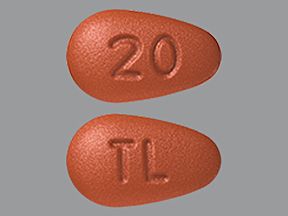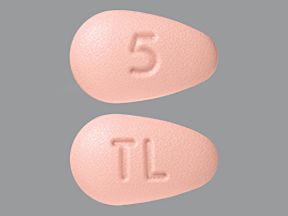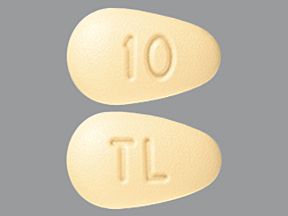Trintellix (vortioxetine) is a brand-name drug that’s prescribed for major depressive disorder. Trintellix comes as an oral tablet that’s typically taken once per day. The dosage can vary depending on your symptoms and side effects.
Trintellix is classified as an atypical antidepressant. Trintellix is not available in a generic version.
Keep reading for specific information about the dosage of Trintellix, including its strengths and how to take the medication. For a comprehensive look at Trintellix, see this article.
Note: This article describes typical dosages for Trintellix provided by the drug’s manufacturer. When taking Trintellix, always follow the dosage prescribed by your doctor.
This section contains information about normal recommended dosages of Trintellix, including therapeutic dosages for treating major depressive disorder (MDD). Therapeutic means that the dosage has been proven effective for treating a condition.
Trintellix form
Trintellix comes as tablets that you swallow.
Trintellix strengths
Trintellix tablets are available in three strengths: 5 milligrams (mg), 10 mg, and 20 mg.
Typical dosages
Typically, your doctor will start you on a low dosage. Then they’ll adjust it over time to reach the amount that’s right for you. Your doctor will ultimately prescribe the smallest dosage within the dosage range that provides the desired effect.
The following information describes dosages that are commonly used or recommended. However, be sure to take the dosage your doctor prescribes for you. Your doctor will determine the best dosing schedule to fit your needs.
The recommended starting dosage of Trintellix is 10 mg once per day.
If the 10 mg dose isn’t working to treat your MDD, your doctor may consider increasing your Trintellix dosage to 20 mg per day.
If you have side effects, however, your doctor may decrease your dose to 5 mg once per day.
Maximum dosage
The maximum dosage of Trintellix for depression treatment is 20 mg per day. (A drug’s maximum dosage is the highest dosage recommended by the drug’s manufacturer.)
If you’re taking certain other drugs with Trintellix, your doctor may recommend a dosage higher than this. Talk with your doctor about the maximum dosage of Trintellix that’s right for you.
Long-term use
Trintellix is meant to be used as a long-term treatment. If you and your doctor determine that Trintellix is safe and effective for you, you’ll likely take it long term.
If you miss a dose of Trintellix, try and take it as soon as you remember. But if it’s almost time for your next dose, skip the missed dose and take your next scheduled dose. Do not take two doses at once to try and make up for the missed dose.
To help make sure that you don’t miss a dose, try using a medication reminder. This can include setting an alarm or putting a note where you’ll see it, such as on your bathroom mirror or bedside table. You could also download a reminder app on your phone.
Below are answers to some frequently asked questions about Trintellix’s dosage.
I switched from taking a different antidepressant to taking Trintellix. What might my dosage be?
It depends. Different antidepressant drugs can have varying strengths and recommended starting dosages. Your doctor may be able to calculate equivalent doses of certain drugs, meaning doses that are about the same or exactly the same in terms of their effects.
Is Trintellix approved to treat OCD? If so, what’s its dosage?
No, Trintellix is not approved to treat obsessive-compulsive disorder (OCD). It may be prescribed off-label to treat this condition, though. Off-label drug use means using a drug for a purpose other than what it’s approved for by the Food and Drug Administration (FDA).
Trintellix is approved to treat major depressive disorder (MDD), which is a severe type of depression. Other drugs used to treat depression may be approved to treat OCD, such as Zoloft (sertraline).
If you have questions about OCD medications, talk with your doctor. They can tell you more about treatment options available to you.
Can Trintellix’s side effects vary by dosage?
Trintellix doesn’t cause different side effects depending on your dosage, but some side effects may be slightly more or less likely depending on your dosage. For example, more people in clinical trials reported nausea while taking a 20-milligram (mg) dose, compared with people who took a 5-mg dose.
If you’d like to learn more about side effects caused by Trintellix, you can read this article. You can also talk with your doctor or pharmacist if you have additional questions.
Is Trintellix prescribed in 25-mg, 30-mg, or 40-mg doses to treat MDD?
Trintellix doses of 25 mg, 30 mg, and 40 mg are not approved to treat MDD. And Trintellix isn’t available in these strengths. However, if you’re taking certain other drugs with Trintellix, your doctor may recommend a dosage higher than the typical maximum dosage of 20 mg per day.
Also, Trintellix doses of 25 mg, 30 mg, or 40 mg may be prescribed for an off-label use of the drug (such as to treat OCD).
Be sure to follow the dosage that your doctor prescribes for you. If you have additional questions about higher doses of Trintellix, talk with your doctor or pharmacist.
What’s the typical dosage for Trintellix 5 mg?
If you’re prescribed the 5-mg tablets of Trintellix for MDD treatment, your dosage would typically be one tablet per day. If this dosage isn’t effective for treating your MDD, your doctor may increase your dosage to 10 mg per day, or up to 20 mg per day if needed.
For more information about typical dosages of Trintellix, see the “Trintellix dosage” section above. You can also talk with your doctor or pharmacist.
The Trintellix dosage your doctor prescribes will depend on several factors. These include:
- the type and severity of the condition you’re using Trintellix to treat
- how effectively Trintellix treats your condition
- any side effects you have while taking Trintellix
- other medications you take
Other medical conditions you have can also affect your Trintellix dosage.
Dosage adjustments
Trintellix has a
It’s important to note that Trintellix is only approved for use in adults.
While taking Trintellix, watch for changes in your thoughts and behaviors. If you’re comfortable telling people who are close to you about this risk, they should also watch for noticeable changes in your thoughts and behaviors. Tell your doctor right away about any changes, or get emergency medical attention.
In addition to this boxed warning, it’s important to note that:
- Your doctor may increase your Trintellix dosage if you take certain drugs that can decrease Trintellix levels in your body.
- Your doctor may decrease your Trintellix dosage if:
- you take certain drugs that can increase Trintellix levels in your body, or
- your body doesn’t break down drugs such as Trintellix like usual, due to a problem with your CYP2D6 protein (which helps your body break down Trintellix)
If you have additional questions about dosage adjustments for Trintellix, talk with your doctor or pharmacist. They can help make sure your Trintellix dosage is safe and effective for you.
* A boxed warning is a serious warning from the Food and Drug Administration (FDA). It alerts doctors and patients about drug effects that may be dangerous.
Suicide prevention
If you know someone at immediate risk of self-harm, suicide, or hurting another person:
- Ask the tough question: “Are you considering suicide?”
- Listen to the person without judgment.
- Call 911 or the local emergency number, or text TALK to 741741 to communicate with a trained crisis counselor.
- Stay with the person until professional help arrives.
- Try to remove any weapons, medications, or other potentially harmful objects.
If you or someone you know is having thoughts of suicide, a prevention hotline can help. The 988 Suicide and Crisis Lifeline is available 24 hours a day at 988. During a crisis, people who are hard of hearing can use their preferred relay service or dial 711 then 988.
Trintellix comes as tablets that you swallow. You can take Trintellix tablets with or without food.
Usually, you’ll take Trintellix once per day. It can be taken at any time of day. But make sure to follow the instructions that your doctor gives you.
If you use more Trintellix than your doctor prescribes, you may develop serious side effects.
It’s important that you do not use more Trintellix than your doctor advises.
Symptoms of an overdose
Overdose symptoms of Trintellix can include:
If you take more than the recommended amount of Trintellix
Call your doctor right away if you believe you’ve taken too much Trintellix. Another option is to call America’s Poison Centers at 800-222-1222 or use its online tool. If you have severe symptoms, immediately call 911 or your local emergency number, or go to the nearest emergency room.
You should not stop taking Trintellix without first speaking with your doctor.
Suddenly stopping Trintellix has been shown to cause some mild side effects sometimes. These can include headaches and muscle tension.
For this reason, if you’re taking a 15-milligram (mg) or 20-mg daily dose and you’ll be stopping Trintellix, your doctor will recommend first decreasing your dosage to 10 mg per day. You should take the 10-mg dose for at least 1 week before you completely stop taking Trintellix, or for as long as your doctor advises.
If you’re taking a 10-mg or 5-mg daily dose of Trintellix, you may be able to stop Trintellix without having your dosage decreased gradually. But you should not do so without first talking with your doctor.
Make sure to discuss stopping Trintellix with your doctor. They may be able to recommend other treatments for your condition.
The dosages in this article are typical dosages provided by the drug’s manufacturer. If your doctor recommends Trintellix, they will prescribe the dosage that’s right for you. Always follow the dosage that your doctor prescribes for you.
As with any drug, never change your dosage of Trintellix without your doctor’s recommendation. If you have questions about the dosage of Trintellix that’s right for you, talk with your doctor.
Besides learning about dosage, you may want other information about Trintellix. These additional articles might be helpful to you:
- More about Trintellix. For information about other aspects of Trintellix, refer to this article.
- Side effects. To learn about side effects of Trintellix, see this article. You can also look at the Trintellix prescribing information.
- Drug comparison. To find out how Trintellix compares with Zoloft, read this article.
- Interactions. For details about what Trintellix interacts with, see this article.
- Details on depression. For details on depression, see our mental health content hub, and our list of depression articles.
Disclaimer: Medical News Today has made every effort to make certain that all information is factually correct, comprehensive, and up to date. However, this article should not be used as a substitute for the knowledge and expertise of a licensed healthcare professional. You should always consult your doctor or another healthcare professional before taking any medication. The drug information contained herein is subject to change and is not intended to cover all possible uses, directions, precautions, warnings, drug interactions, allergic reactions, or adverse effects. The absence of warnings or other information for a given drug does not indicate that the drug or drug combination is safe, effective, or appropriate for all patients or all specific uses.



